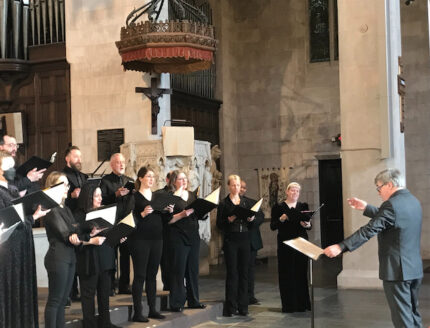Paul Hillier, Bella Voce reunite to celebrate choir’s 40th anniversary in style

Andrew Lewis, artistic director of Bella Voce, could hardly have found a more appropriate capstone for the yearlong celebration of the group’s 40th anniversary than by bringing back Paul Hillier—one of its most distinguished guest conductors of the 1980s and ‘90s—to take charge of concerts last weekend at churches in Chicago and Evanston.
Hillier is a longtime friend of Bella Voce, having first guested with the Chicago vocal ensemble in 1987 when it was performing under its original name, His Majestie’s Clerkes. At the time the British baritone, scholar, early music pioneer and co-founder of the Hilliard Ensemble was fast building an international reputation. The Clerkes invited him back several times during the 1990s when he made a series of highly praised recordings with them for the Harmonia Mundi label.
His long absence was all but certain to help guarantee full houses for both concerts. Predictably enough, the Sunday afternoon program at St. Luke’s Church in Evanston was packed with listeners, including Lewis and Anne Heider, Lewis’ directorial predecessor.
Hillier put together a rewarding mix of some of his favorite unaccompanied choral pieces that spanned the 13th century to the present—juxtaposing works by living composers Arvo Pärt, Caroline Shaw, Anna Thorvaldsdottir and Julia Wolfe with medieval and Renaissance sacred polyphony by Tomas Luis de Victoria, Jean Ockeghem and Guillaume Dufay, as well as anonymous works arranged by Hillier.
Such was the stylistic discernment and expressive fervor with which one piece was set against the other that the old music felt rather modern in sensibility, while the contemporary pieces resonated with impulses recognizable from early church music.
Bella Voce is, of course, a practiced hand at this sort of enlightened musical time travel. Sunday’s music showed off their versatility as well as virtuosity, in texts ranging from Latin to English, Icelandic, Estonian and Church Slavonic.
Their pure timbre, superb blending and balancing of voices and deep understanding of how words and music combine to heightened expressive effect was once again in evidence, further enhanced by Hillier’s expertise as a director of ensemble voices. The man knows this repertoire better than anyone alive and he conducts it better than just about anyone. The beautiful singing he elicited from the 20 exceptional vocalists of Bella Voce floated with an ethereal glow in the spacious but clear acoustic of St. Luke’s church.
Hillier is among our leading authorities on the music of Pärt and it was he who led Bella Voce (in its previous incarnation) in the 1990 North American premiere of the Estonian composer’s Passio, a setting of the St. John Passion.
The pairs of Pärt works that Hillier linked to stylistically apposite sacred pieces of Victoria (the familiar motets Alma redemptoris mater and O magnum mysterium) on the second half of the program were written between 2012 and 2017. These pieces adhere to a less austere, more diatonic musical grammar than some of his other neo-medieval scores.
The simple, folk-music-like charm of music depicting three shepherd children experiencing the apparition of the Virgin Mary was nicely set off by the warmly hymnic meditation of his pilgrim song Habitare fratres in unum. A similar text involving a sighting of the Virgin informs Virgencita, with its poignant refrain of “Salve nos” (“Save us”) and soulfully intense climax. In And I heard a voice, Pärt spreads a balm of harmonic consolation over a biblical text (sung in Estonian), to telling effect.
Pairings of Ockeghem, Dufay and anonymous medieval “allelulias” with contemporary Psalm settings by Shaw, Thorvaldsdottir and Wolfe also yielded aurally bracing musical discoveries.
Shaw’s And the swallow (from Psalm 94) uses aching suspensions and striking harmonic shifts to create a luminous, mystical effect within a tiny timeframe.
With her piece Heyr thu oss himnum a, Thorvaldsdottir breathes new life into an old Icelandic psalm with a quiet fervor far removed stylistically from her signature icy austerity.
Wolfe’s Guard my tongue (from Psalm 34), the most technically and musically rigorous of the contemporary pieces on Sunday’s bill, found the choir fully inside the thrumming drones, dancing rhythms and insistent repetitions of text.
A brief Walt Whitman setting by the contemporary British composer Howard Skempton made for a flavorsome encore.
Another return invitation for Hillier in some future season would appear to be mandatory.
The Bella Voce Camerata joins the Newberry Consort for “Singen und Sagen: Music for Hope in a Time of War” May 13 and 14. bellavoce.org
Posted in Performances

